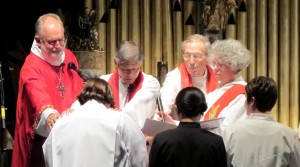I led worship at Redmond UMC on July 3rd, 2011, while our new pastor Cara took the weekend off after having spent the previous weeks at Annual Conference and moving her family of five from Seattle to Redmond. The Matthew passage from the Lectionary spoke well to transition and discernment in times of change, so it was easy to adapt to where the people of Redmond UMC are. This sermon was very much directed at the people of Redmond UMC, but I believe that if you can impose examples from your own life as you listen, there will be wisdom for any listener in how we can discern whether changes are good, and also how we address psychological roadblocks to needed change.
The actual sermon is from 0:22 to 31:25. The first 20 seconds is me apologizing for accidentally reading a portion of a scripture that I didn’t plan to read. The end is me describing, praying over, and inviting the congregation to join in a Love Feast. Yes, that does mean the sermon is over 30 minutes long.
Well, I may be biased, but I think it’s worth 30 minutes of your time!
If you’re still not convinced, here’s the basic outline of the main points. The sermon is so much more, however:
Three ways to discern whether the new thing is good
- Faith Like a Child — curiosity, openness, innocence, but also hardship and vulnerability. Trusting completely in God
- What criteria will we use? — Human criteria or heavenly criteria? “Wisdom is vindicated by her deeds” and “by their fruits you shall know them” (Matthew 7:16). Fruits of the Spirit (Galations).
- Test everything, hold onto the good (1 Thessalonians 5:21)
Obstacles to embracing the new thing, even if it is good
- Fear of unknown; fear of failure and Success (Marianne Williamson quote). Courage is not the absence of fear. WE do it together.
- Love for the “old wineskins” (Matthew 9).
- Being too comfortable, building up wealth, not wanting to relinquish our social power
